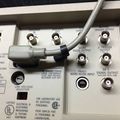2440: Difference between revisions
No edit summary |
(Updated full service manual with PDF downloaded from Tektronix rather than scanned version.) |
||
| Line 14: | Line 14: | ||
* [[Media:070-6601-00.pdf|Tektronix 2440 Programmer Manual]] | * [[Media:070-6601-00.pdf|Tektronix 2440 Programmer Manual]] | ||
* [[Media:070-6602-00.pdf|Tektronix 2440 GPIB Pocket Guide]] | * [[Media:070-6602-00.pdf|Tektronix 2440 GPIB Pocket Guide]] | ||
* [[Media:070-6603-00.pdf|Tektronix 2440 Service Manual]] | * [[Media:070-6603-00.pdf|Tektronix 2440 Service Manual (complete, B014064 and below)]] | ||
* [https://w140.com/tek_2440.pdf Tektronix 2440 Service Manual (without schematics)] | |||
* [https://w140.com/tek_2440.pdf Tektronix 2440 Manual (without schematics)] | |||
* [[Media:2430A-2432A-2440-catalog.pdf|2430A/2432A/2440 catalog page]] (OCR) | * [[Media:2430A-2432A-2440-catalog.pdf|2430A/2432A/2440 catalog page]] (OCR) | ||
}} | }} | ||
Revision as of 21:07, 2 August 2023
The Tektronix 2440 is a two-channel 300 MHz, 500 MS/s digital sampling oscilloscope from the late 1980s.
It uses CCDs (essentially, analog shift registers) to store input samples at high speed and a single 8 bit flash A/D converter to digitize the time-multiplexed CCD output signals at 4 MS/s.
WARNING:
Operation of the 2440 (and 2432 and 2430): A/D-converter and CCD hybrids may suffer irreparable damage within a few minutes if operated out of the metal enclosure without extra cooling.
Key Specifications
| Bandwidth | 300 MHz (Limit: 20, 100, Full) |
|---|---|
| Sampling rate | 500 MSa/s each channel with simultaneous acquisition |
| Deflection | 2 mV/div to 5 V/div in 1-2-5 sequence |
| Auto scale factor | On-Screen Readout indicates probe tip deflection factors for ×1, ×10, ×100 and ×1000 probes |
| Input impedance | 1 MΩ // 15 pF |
| Sweep speeds | 2 ns/div to 5 s/div in 1-2-5 sequence (Modes A, A Intensified and B) |
| Auto measure | Simultaneously measures up to four parameters on one or more displayed waveforms, updated at 3 Hz intervals or display a snapshot of 20 parameters of waveform target |
| Acquisition modes | Normal, Envelope (glitch capture), Average |
| Display modes | CH1, CH2, invert, add, multiply, X-Y |
| Cursors | Volts, Time, Volts At Time, 1/Time, Slope |
| Functions | A Mode - Auto Level, Auto/Roll, Normal and Single Seq; B Mode - Trigger After Delay, Runs After Delay, 1K Record Length and more |
| Interface | GPIB |
| Probes | Two passive P6137 400 MHz ×10 voltage probes, 1.3 m |
| Power | 90 to 132 VAC or 80 to 250 VAC, 48 to 440 Hz; 160 W |
| Features |
|
| Options |
|
Links
Internals
The 2440 employs several processors − an MC68B09 main CPU controls the instrument, a custom 16-bit waveform processor performs signal computations, and an MC6805 microcontroller handles the front panel interface. The GPIB Interface is implemented with a TMS9914 controller.
The power supply consists of a buck-type pre-regulator followed by a push-pull inverter and linear post-regulators (except for the +5 V digital supply rail).
CRT is a 154-0850-01.
Pictures
CRTs used in the 2440
| Page | Part nos | Description | Designers | Used in |
|---|---|---|---|---|
| 154-0850-01 | 154-0850-00 • 154-0850-01 | CRT | 2424L • 2430 • 2430A • 2431L • 2432 • 2439 • 2440 • 2445 • 2465 • 2465A • 2465B |
Custom ICs used in the 2440
| Page | Model | Part nos | Description | Designers | Used in |
|---|---|---|---|---|---|
| 155-0242-00 | 155-0242-xx | 155-0242-00 • 155-0242-01 | Z-axis amplifier and autofocus | Mike Metcalf | 2215 • 2252 • 2440 • 2445 • 2445B • 2465 • 2465B • 2467 • 2467B |
| 155-0294-00 | 155-0294-0x | 155-0294-00 • 155-0294-01 | Z-axis amplifier | 2424L • 2440 | |
| 165-2273-00 | 165-2273-00 | 165-2273-00 | peak detector | 2432 • 2432A • 2440 |








